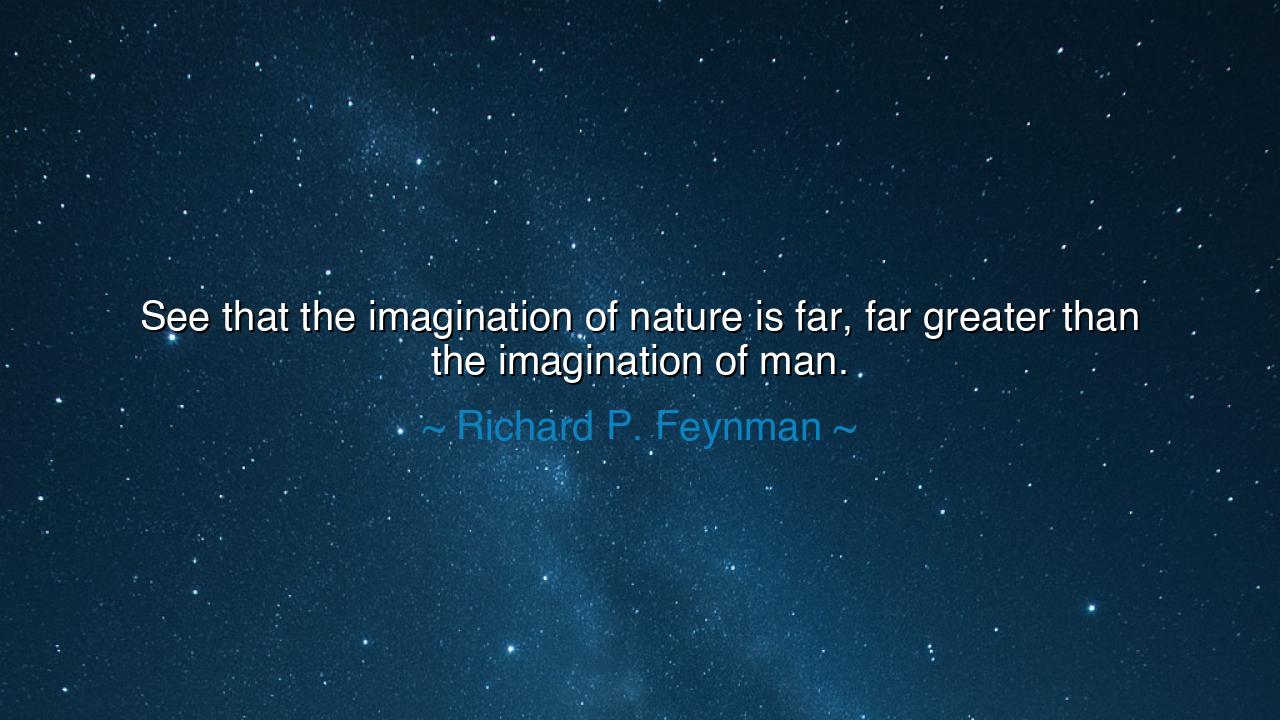
See that the imagination of nature is far, far greater than the






"See that the imagination of nature is far, far greater than the imagination of man." Thus spoke Richard Feynman, a sage of modern science, whose mind danced between the realms of mathematics and wonder. In this saying lies a truth older than the stars themselves—a truth whispered in the rustle of leaves and sung by the sea. Feynman, though a physicist of the twentieth century, spoke with the spirit of an ancient philosopher: he reminded humankind of its smallness before the infinite artistry of nature’s imagination. He saw that while man may dream in equations and stories, the universe dreams in galaxies and living forms—each more intricate and breathtaking than our wildest visions.
In the beginning, before man could write or reason, there was creation—a cosmic explosion that flung dust into light, chaos into order, and silence into the song of life. From that unthinkable spark arose stars, oceans, and the breath of beasts. Did any mortal mind conceive such beauty? Could human imagination alone have shaped the spiral of a seashell or the precise geometry of a snowflake? Nay. Nature imagines through being, not through thought. Her dreams are not drawn on paper but woven into the fabric of existence itself. She paints with time and motion, her canvas the infinite expanse of space.
There is a story from the days of Darwin, who, upon studying the endless forms of life upon the earth, wrote that there is “grandeur in this view of life.” When he saw that every creature, from the crawling worm to the soaring eagle, was bound by one thread of life, he trembled with awe. For in that moment he understood what Feynman would later echo: that nature’s imagination surpasses our own, for she has devised systems beyond human comprehension—interwoven, adaptive, and eternal. Even the simplest cell, invisible to the naked eye, carries in its design more wonder than the greatest palaces of kings.
And yet, man, in his pride, has often believed himself the master of creation. He builds towers that touch the heavens, machines that fly, and engines that split the atom. But every triumph reveals a deeper mystery. When man unraveled the structure of the atom, he did not conquer nature; he only discovered that she holds infinities within infinities. Feynman himself once said that to truly see the universe is to stand before “a great tapestry we cannot fully understand.” The imagination of man creates stories; the imagination of nature creates existence itself.
Consider the butterfly—the humble messenger of this truth. Its wings, adorned with iridescent colors, are not painted by any hand but formed through microscopic scales that bend light into beauty. No artist has matched its precision; no craftsman has equaled its grace. The butterfly is nature’s whisper to us: “See how I dream.” It is a poem written in silence, reminding us that nature’s creativity does not need applause, for it is both the stage and the performance.
But this revelation is not meant to humble us into despair. Rather, it calls us to reverence and participation. For though we cannot surpass nature’s imagination, we are born of it. We are her children, shaped by her infinite mind. The power that spins galaxies also beats within our hearts. When we create music, paint, or explore the mysteries of science, we do not compete with nature—we continue her work. We give voice to her silence, thought to her movement, wonder to her order.
Therefore, the lesson of Feynman’s words is this: to be wise is to be in awe. Let not arrogance blind the eyes of discovery. When you gaze at the stars, see not a cold void, but a vast imagination dreaming itself into being. When you walk through the forest, know that every leaf is a page of the universe’s eternal story. Learn to listen—to the wind, the water, and the quiet of your own soul—for there, too, nature speaks.
And so, my children of the ages, live not as conquerors of nature, but as students of her boundless imagination. Seek knowledge, but temper it with wonder. Build, but build in harmony. Create, but remember who first taught you to dream. For the imagination of man is a candle; the imagination of nature, a sun. To see this truth, as Feynman did, is to awaken—to stand in the eternal light of awe, and to bow before the vast, living mystery that gave us all birth.






AAdministratorAdministrator
Welcome, honored guests. Please leave a comment, we will respond soon